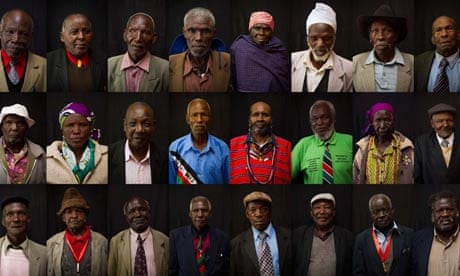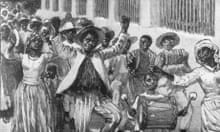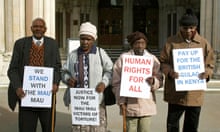The government is expecting compensation claims from across Britain's former empire following Thursday's announcement that payments are being made to thousands of Kenyans imprisoned and tortured during the bloody Mau Mau insurgency that preceded the country's independence.
The Foreign Office has already been put on notice that it will be receiving a claim from lawyers representing a number of Cypriots who allege that they too were mistreated during the island's decolonisation conflict in the 1950s.
Further claims are expected from Kenya, and more may be lodged by citizens of several other former colonies.
While announcing the settlement, and expressing the government's "sincere regret" for the way the British colonial authorities treated their prisoners, the foreign secretary, William Hague, warned that future litigation may be resisted in the same way as in the Kenyan case. Government lawyers battled for four years to keep the claim out of the courts before admitting defeat.
"We will … continue to exercise our own right to defend claims brought against the government," Hague told MPs. "We do not believe that this settlement establishes a precedent in relation to any other former British colonial administration."
The Foreign Office and Ministry of Justice have also said that any future claims could be heard under the controversial secret court system established by the Justice and Security Act, which comes into force next month.
Some 5,228 Kenyans are to receive a total of £13.9m in compensation – worth about £2,600 per person – under the terms of the settlement. The government is also paying £6m in legal costs and has agreed to fund the construction of a memorial to the country's victims of colonial-era torture.
Hague said: "I would like to make clear now and for the first time … that we understand the pain and grievance felt by those who were involved in the events of the Emergency in Kenya. The British government recognises that Kenyans were subject to torture and other forms of ill treatment at the hands of the colonial administration.
"The British government sincerely regrets that these abuses took place, and that they marred Kenya's progress towards independence. Torture and ill-treatment are abhorrent violations of human dignity which we unreservedly condemn."
Hague stressed that the government continued to deny legal liability. However, government lawyers admitted the truth of allegations of brutal mistreatment – including castration – made by three Kenyans who brought a test case, and the high court has ruled that the government was potentially liable.
In Nairobi the British high commissioner, Christian Turner, met some of the claimants to echo Hague's expression of regret. Although the government was not admitting legal liability, "there is today this deep expression of regret and acknowledgement of the wrongs that we've committed".
Despite the careful caveats, Hague's words were seen by many in Kenya as amounting to an apology. "Forget the money they're going to give us. Money comes and goes but the word sorry will last for ever," said Matheng Irengi, 81, one of the successful claimants. "I know the British people, and they never ever say sorry to anybody. They can say sorry individually, but as a country, never. This is something that has surprised even myself."
Irengi said British officials beat him, tortured him with pliers and twisted his left arm until it dislocated.
Atsango Chesoni, executive director of the Kenya Human Rights Commission, said: "Those who commit serious human rights violations, regardless of their standing or position in society, or their might among the nations of the world, must he held to account for their actions."
The Kenyans' lawyer, Martyn Day, said: "I take my hat off to Mr Hague for having the courage to make today's statement and to announce this settlement with our clients. Albeit he was looking down the barrel of the gun in terms of a court process which he had a strong chance of losing, it takes courage to publicly acknowledge for the first time the terrible nature of Britain's past in Kenya."
More than 100,000 people were detained during the eight-year conflict. Thousands suffered beatings and sexual assaults during "screenings" to extract information about the Mau Mau. Later, prisoners suffered even worse mistreatment in an attempt to force them to renounce their allegiance to the insurgency and obey commands. Significant numbers were murdered; official accounts describe some prisoners being "roasted alive".
Day said the claimants' physical and mental scars remained. "Many of those who were detained and tortured were never tried and had little or nothing to do with the Mau Mau insurgency. The elderly victims of torture now at last have the recognition and justice they have sought for many years. For them the significance of this moment cannot be over-emphasised."
The settlement came only after the government suffered two significant defeats in the courts. During the first round of hearings, its lawyers argued that the claimants should not be suing the British government, but the Kenyan authorities, which had inherited London's legal responsibilities on independence, under the principle of states succession. During the second round, the British government acknowledged that the allegations of murder and torture were true, but argued that too much time had elapsed for there to be a fair trial. That position was rejected by the high court in October.
The turning point came when a number of historians who gave evidence as expert witnesses realised the government's disclosure of documentation was incomplete. This in turn led to the government admitting to the existence of an enormous secret archive of more than 8,000 files from 37 former colonies. Some of those papers corroborated the claimant's accounts of appalling abuse inflicted on inmates of the network of prisons that the British established during the insurgency.
While the contents of that archive could support claims from a number of former colonies, a number of rulings in the House of Lords mean that no damages claims arising from events before June 1954 can be brought in the English courts.







